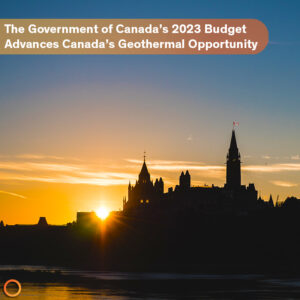On March 28, 2023, Chrystia Freeland, the Deputy Prime Minister and Finance Minister, tabled Budget 2023, A Made-in-Canada Plan: Strong Middle Class, Affordable Economy, and Healthy Future.
Promoting the commercialization and viability of emerging clean technologies to enhance greenhouse gas reduction, job creation, and economic diversification remains a national priority. Various policy mechanisms, some of which are mentioned below, aim to advance this goal, including:
- Tax rate reductions for zero-emission technology manufacturers;
- Tax credits for clean electricity production;
- Investment tax credits for clean technology manufacturing; and
- Additional funding for the Strategic Innovation Fund.
Recognizing the potential of Canada’s geothermal sector within the cleantech ecosystem, Budget 2023 expanded the eligibility of the Clean Technology Investment Tax Credit (CTITC), first announced in the Fall Economic Statement, to include geothermal energy systems under classes 43.1 and 43.2 of the Income Tax Regulations. The tax credit establishes a 30 percent tax credit for geothermal infrastructure producing electrical and/or heat energy. Eligible property includes but is not limited to piping, pumps, heat exchangers, steam separators, and electrical generating equipment. The inclusion of geothermal systems is valued at approximately $185 million.
The tax credit’s expanded scope will positively impact the Canadian geothermal community and ensure Canada remains competitive with President Biden’s recently announced Inflation Reduction Act by promoting domestic geothermal infrastructure investments. The decision to include geothermal systems represents an enormous first step in positioning Canada, and especially Alberta, as a global epicentre for geothermal technology commercialization and exports. This opportunity is corroborated by three key synergies and partnership opportunities with the oil and gas sector:
- Labour: Oil and gas professionals like engineers, geologists, and red seal trade persons can find direct employment within the geothermal sector without retraining, facilitating new employment opportunities.
- Capital: Conventional energy infrastructure, such as idle drilling rigs, can be repurposed and used for geothermal applications.
- Economic Diversification: The geothermal industry provides an economic buffer when commodity prices fall, allowing displaced labour and capital to be utilized to support economic growth.
“Stacking the tax credit with other public policy mechanisms enables Eavor to reassess its Canadian project portfolio, making projects more viable over the short to medium term. We thank the federal government for recognizing and advancing Canada’s geothermal potential. Eavor looks forward to continued collaboration with all levels of government to promote national prosperity and job creation in partnership with the oil and gas sector.”
– Brian Senio, Government Relations & Corporate Development Associate



















